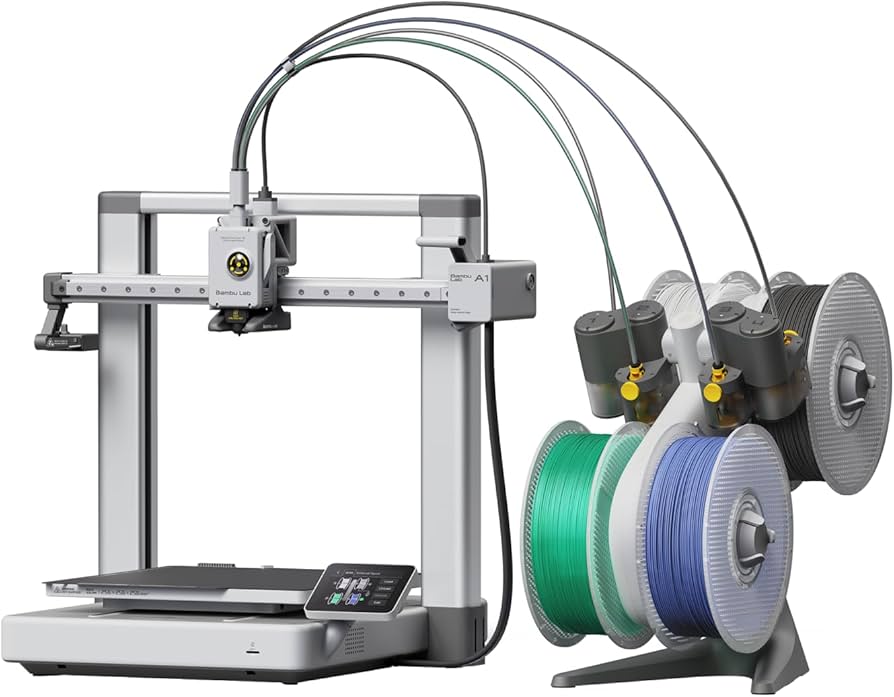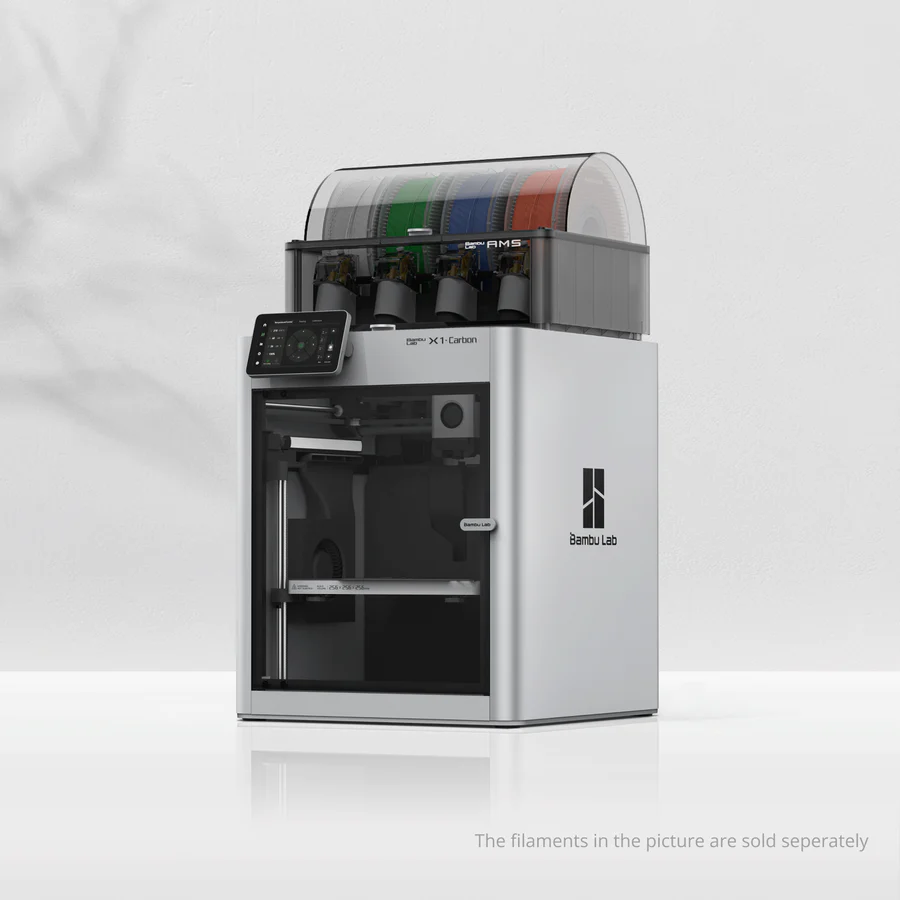Compare A1 vs X1 carbon
Comparison between the best 3D printers
Choose the best 3D printer at the best price. The cheapest 3D printers are here.
Buy a 3D printer here with 3D Fila.
 |
 |
|
| Model | A1[BUY A1] |
X1 carbon |
| Printing Material | Filament | Filament |
| Buy Filament for Bambu Lab A1 | Buy Filament forBambu Lab X1 carbon | |
| Estimated price | $700,00 | $1449,00 |
| Manufacturer | Bambu Lab | Bambu Lab |
| Release Year | 2023 | 2023 |
| Print Volume [mm] | 256x256x256 | 256x256x256 |
| Printer Size [mm] | 385x410x430 | 389x389x457 |
| Weight [kg] | 8,3 | 14,13 |
| Power Loss Recovery | YES | YES |
| Enclosed printer | NO | YES |
| Bed Leveling | Automatic | Automatic |
| Filament End Sensor | YES | YES |
| Bed type | Heated | Heated |
| Power supply system | Direct Drive | Direct Drive |
| Standard nozzle | 0,4 | 0,4 |
| Maximum Nozzle Temperature [°C] | 300 | 300 |
| Maximum Bed Temperature [°C] | 100 | 120 |
| Maximum printing speed [mm/s] | 500 | 500 |
| Filament holder | YES | YES |
| Camera for supervision | YES | YES |
| Recommended filaments | PLA, PETG, TPU, PVA | PLA, PETG, TPU, PVA, PA, PA-CF, Nylon, PC |
| Recommended slicers | SuperSlicer, PrusaSlicer, Cura, OrcaSlicer | Bambu Studio, Super Slicer, Cura, Prusa Slicer, Orca |
| Maximum Resolution [mm] | 0,1 | 0,1 |
| Processor | Quad ARM A7 1.2 GHz | |
| Display | Touchscreen 3,5 | Touchscreen 5'' |
| Power Supply | 350 W | 350 W |
| Connectivity | Wi-Fi, Bambu-Bus, Cartão Micro SD | Wifi, Bambu bus, Cartão SD |
| Operating systems | Windows, Linux, Macbook | Windows, Linux, Macbook |
| Date of registration in the system | 2024-07-17 | 2024-04-10 |
| Release date | 2023 | 2023 |
| Extra features | The BambuLab A1 printer features fully automatic calibration, multi-color printing with the AMS system, active flow rate compensation, quick nozzle change with a clip, active motor noise cancellation, a build volume of 256x256x256 mm³, a maximum extruder temperature of 300°C, and a heated bed of up to 100°C. In addition, it has high precision, a machine health management system and an intuitive 3.5-inch touchscreen interface. | The Bambu Lab X1 Carbon revolutionizes 3D printing with stunning design, high print speeds, and a streamlined user experience. It stands out with its CoreXY system, a hotend capable of reaching 300°C, allowing for a wide range of filaments. Its LiDAR-assisted bed leveling system, vibration compensation, and AMS multicolor printing capability raise the industry standard. Print quality is impressive, with the ability to fine-tune for perfection. The X1 Carbon, with its closed build volume, not only promises but also delivers one of the most advanced 3D printing experiences available to consumers. |
| Support for multiple colors and materials (AMS and CFS) | YES | YES |
Notes * |
||
| Cost-benefit | 7 / 10 | 7 / 10 |
| Hardware | 4.8 / 10 | 6.4 / 10 |
| Tela | . | . |
| Print volume | 4 / 10 | 4 / 10 |
| Performance | 4 / 10 | 4 / 10 |
| [BUY A1] |
Conclusion |
| In comparing the Bambu Lab A1 and Bambu Lab X1 Carbon 3D printers, both models exhibit strengths suited for different user needs and budgets. The A1 offers an appealing cost-benefit ratio, providing essential features like automatic bed leveling, a heated bed, and a camera for supervision. It shines in its ability to handle multiple filament types while maintaining a compact design, making it a solid choice for hobbyists or those new to 3D printing. The A1 features a lighter weight and an intuitive touchscreen interface that enhances user experience. On the other hand, the X1 Carbon positions itself as a premium option with advanced features. Its CoreXY system, LiDAR-assisted bed leveling, and closed build volume elevate print quality and reliability, making it suitable for users seeking professional-grade results. This printer supports a wider array of materials and boasts added capabilities like vibration compensation, which further refines the printing process. Ultimately, the choice between the two will depend on user priorities. For those prioritizing cost-effectiveness and ease of use, the A1 delivers a commendable package. Conversely, the X1 Carbon is ideal for users who demand cutting-edge technology and the highest print quality, justifying its higher price point. Your decision should align with your specific needs, intended use, and budget constraints. |

